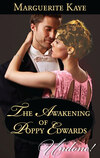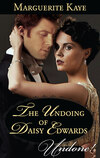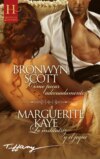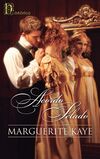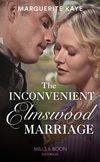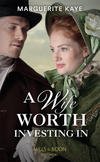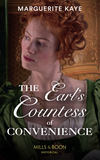Loe raamatut: «The Awakening Of Poppy Edwards»
Los Angeles, 1924
Broadway producer Lewis Cartsdyke has come to Hollywood with a business proposition for starlet Poppy Edwards. But as he’s watching her sing in a downtown club, dressed in a man’s suit that skims her lush curves, a much more wicked proposal comes to mind.
Poppy has fame, wealth and an aversion to love. Lewis offers the kind of passion she craves—delicious, sensual heat without complications. Night after night she abandons herself to sensation, promising she won’t lose her heart the way her sister did. But for Lewis, uncomplicated is no longer enough—and soon he won’t be satisfied until he’s claimed all of Poppy in blissful surrender.
The Awakening of Poppy Edwards
Marguerite Kaye

MILLS & BOON
Before you start reading, why not sign up?
Thank you for downloading this Mills & Boon book. If you want to hear about exclusive discounts, special offers and competitions, sign up to our email newsletter today!
Or simply visit
Mills & Boon emails are completely free to receive and you can unsubscribe at any time via the link in any email we send you.
Table of Contents
Cover
Back Cover Copy
Title Page
Chapter One
Chapter Two
Chapter Three
Chapter Four
Chapter Five
Chapter Six
Epilogue
About the Author
Extract
Copyright Page
Chapter One
Los Angeles, January, 1924
Lewis
The club was downtown under a Venice Beach grocery store, and a very far cry from the harem-like decadence of the Cocoanut Grove, where I’d had dinner the night before under the palm trees. Bunty’s this place was called, according to my source, though there was no sign of any sort over the door. A fug of smoke so thick it stung your eyes hung low like a dirty bit of lace over the roped-off dance floor where six girls dressed in some exhausted-looking silk flowers were doing an unenthusiastic hula.
My backhander bought me a table at the front along with a glass of something they called bourbon, which was probably about as authentic as the dancers’ costumes. I took one sniff and put it to the side. Above me, on the balcony, men were leaning over and catcalling. In Harlem, a place like this would be stuffed full of wannabe sophisticates out to claim their stake in history by taking part in the Jazz Age. Whatever that is. Fitzgerald and his like have a lot to answer for. I met him in Paris once. Unlike most of his acolytes, he struck me as the real deal, dead set on taking the road to destruction just as fast as he can travel.
I was thinking about him as I sat, not drinking my drink, watching the dancers in that louche little club making their dates with their exit. I was thinking I could be just like him if I let myself. Not the writing, but the self-destructing. I was thinking that I had a hell of a lot more reason than Fitzgerald, too, because to my knowledge he’d never seen what I’d seen.
But that’s a path I’ll never take. What happened in Europe, what I saw, it could have destroyed me, but I won’t let it. That’s the difference between me and the others. That sounds smug. I’m not smug, but I’m darn sure I’m not gonna let myself wallow, either. I know I’m one of the lucky ones. I owe it to the rest to make the most of my luck, and that’s what I’m doing. If I’m not happy, then I ought to be. I’m good at what I do. I like it, too. I have any number of people happy to claim I’m their friend. Any number of women, too, though I’m not one of those guys who needs anyone except myself. I’m not lonely; I’m self-reliant. That’s what the war taught me more than anything, that the only person you can depend on is yourself. I’m happy. Why shouldn’t I be happy?
I’d taken a sip of the bourbon. It was just as bad as I’d thought it would be. Thankfully, my thoughts were interrupted by the MC announcing the next act. I didn’t recognise her at first. I was expecting a blonde, and the person who walked onto the stage had black hair. I was expecting the soft curves and low-cut dresses she wore on-screen, not a man’s dinner suit. I was expecting her to sing something bubbly, light, fun, flirty. I was expecting her to be sexy, vampy, maybe even cute. Like her movies. What I got—my God, what I got.
She sang a jazz number I didn’t recognise, though it was, needless to say, about a woman done wrong. Her voice was husky, smoky, the sort of voice that makes your hair stand on end. She didn’t milk it the way another singer might, and it was all the more believable for that, her song. She stood there in front of the band, in her too-big man’s suit with her slicked-back hair and her face completely devoid of cosmetics, all big eyes and pale cheeks and sultry mouth, and I’ve never seen any woman so incredibly sensual in my life.
I’d been sceptical about her ability to act. That was why I’d come here, on a tip-off. I realised two things at that moment. She was wasted on the screen. And I wanted her.
Poppy
I don’t know what it was that made me notice him. Usually when I’m singing I don’t notice anything or anyone save for the band. He was alone, which was unusual, but it wasn’t that. It was the stillness of him. The way he was watching me, so focused, utterly intent. I let him catch my eye, something I never do because it gives men all sorts of wrong ideas. And some women. In the early days, when I first started singing here, when I first realised that I had to sing somewhere, even if walking on stage alone brought back such painful memories, back then I used to—sometimes. I tried both, men and women. Neither worked as well as I hoped. Maybe because I thought they wouldn’t.
But this man. I’d never seen him before, that much I was sure of. He wasn’t good-looking enough to be in films. His hair was cut short, no floppy bit at the front to slick back, but really short, as though he didn’t want to be bothered with it. There were lines on his high forehead. He was clean-cut, no fashionable moustache. A strong jaw that a camera would love. Deep-set eyes. I couldn’t see the colour in the fug of the club, but I could feel them on me. Boring through me. Watching.
I sang two songs. Songs that would have surprised Daisy, shocked her, even, but I can’t sing the old stuff, and this new jazz, it suits me. I don’t just mean my voice, but the lyrics, the mood. So sad. As if they were written for me. When the dancers came out at the end of my slot, I could have edged backstage as I always did, but I didn’t. Even though he made no sign, I went over to his table and sat down opposite him. His eyes were blue. He was younger than I’d thought, maybe thirty. And he had that indefinable air about him, of wealth or power or both.
‘You were staring,’ I said, by way of introduction.
‘You were extraordinary.’
‘I can hold a tune.’ I shrugged, but I was pleased, and that surprised me, because my singing, it’s very personal. You’ll say that’s a contradiction, because if it was so personal then I wouldn’t do it onstage. But no one knows me here—or if they do, it’s the kind of place where they choose not to say. And Bunty’s, it’s like no place I’ve ever performed before—there’s nothing to remind me of those times. When I sing here, the songs are for me. Just for me. So like I said, I was kind of surprised to be pleased, because usually I don’t give a damn.
‘Is there somewhere we can talk?’ he asked me.
Did he mean talk? I was pretty shocked to discover I hoped not, though he made me nervous. Or I made myself nervous. The way I’d noticed him. The way my body noticed his, such a contrast between us, in the way he filled his dinner suit. There was a kind of ruggedness in him that I liked. He wasn’t smooth or debonair or any of those movie-star qualities I saw day in, day out on-set. His appeal was much more basic—and I don’t mean like that phoney, Tarzan of the Apes kind of basic, either.
I led him to the bar. It was empty because the show was in full swing, and anyway, it had a class that the floor space didn’t. They had real booze on the glass shelves, not hooch, and the ceiling was beaten copper, a strange, wavy design that was echoed on the bar top. Like a stormy sea. I liked it. We sat on the high stools and ordered highballs. He had long legs. Not scrawny, either. And he didn’t smoke.
‘Do you have a name?’ I asked.
‘Do you?’
The way he said it made me wary. No one from the studio knew I sang here. Ridiculous to think—I reminded myself that he couldn’t really see inside my head, even though he gave that impression. I took a swig of my drink. ‘You heard them announcing me,’ I said. ‘I’m Very Simply Vera.’
‘Vera. Right,’ he said, and I told myself it was just my imagination, the doubt I heard. ‘Well, I’m Lewis. Pleased to meet you, Vera.’
‘Lewis.’ We clinked glasses and stared at each other. I was feeling decidedly edgy now. Part of me wanted to run. I just about managed to stop myself from checking that my wig was in place. It wouldn’t move—I’d fixed it painfully thoroughly. My breath was coming in short little huffs, as if I’d been running, and I couldn’t get it under control. My heart was racing, as if I’d drunk way too much of the stuff the studio calls coffee. We were sitting side-on to the bar, so our knees were touching. When I reached for my glass, even though I didn’t want to drink, he caught my hand in his.
I should have pulled away but I didn’t. His skin was warm. His fingers were rough. He didn’t say anything, but it was clear, in the way his eyes seemed to blaze at me, how much he wanted me. I felt an answering heat. I can’t remember the last time I’d felt like that. Not in a long time. Never so strongly. I was crazy to even consider it. The man was a total stranger. We’d barely exchanged half a dozen words. But I was already past considering. And the fact that he was a total stranger was kind of the point. I didn’t need complications. I certainly didn’t want them. But what I wanted, really wanted, was this man.
Is that shocking? I don’t know why it should be. I’m twenty-seven years old, not seventeen, and no matter what the studio would have the world believe, no matter how well it suited us for the world to believe, that was never going to happen between Randolph and me. Years ago I had to stand by and watch the mess love made of Daisy. It didn’t so much destroy her as empty her out. She was there, and not there. The war. It wasn’t just the men in the trenches who died. When her husband was killed, he took Daisy with him. I couldn’t get her back. I tried, but there was nothing left to of her to retrieve. She lost Anthony and she lost her voice. I lost her and our act. That’s why I’m here—I couldn’t stay. Neither of us could bear it. Together we’d just have kept reminding each other of what had happened. With an ocean between us, we can pretend it didn’t, which is what we do. Pretend I chose to come here. To go along with her story that it was the chance she’d been waiting for to go out on her own. I thought maybe after a year she’d join me or ask me back.
Five years, it’s been. Which is fine, because life is good here, it really is. I’ve worked blooming hard to make sure of that, to change myself from one of the Edwards Sisters to Poppy Edwards, star of the silver screen, and sometimes Very Simply Vera. I’m here and I’ve every reason to be happy and it’s all down to me, and me alone, and that’s the way it’s going to stay. So you can see, can’t you, why I don’t, won’t, will never do the hearts-and-flowers stuff.
The problem though, was that while I’m more than immune to romance, I do like the—now I’m going to be shocking again, but there it is—I like the sex, and what’s more, I don’t see why being anti one means I should be deprived of the other. So maybe it had never quite lived up to my expectations, but that just meant I should persevere, right? I mean, that’s what you do, isn’t it? If at first you don’t succeed, and all that. And I had a feeling that with this man it would be good.
So I drained my glass quickly and slithered to my feet. ‘Ready?’ I asked him.
He looked taken aback for about a second, and for about a second I felt as if I’d got the upper hand. I realised I’d have to keep it like that, too. This was not a man who would take kindly to being messed about.
‘Where to?’ he asked, throwing a note down on the bar, catching up quickly enough.
I couldn’t take him home, obviously. ‘You tell me.’ I gave him one of my seductive smiles. They worked well on-screen. They worked very well on Lewis. ‘I’m at the Ambassador,’ he said, ushering me up the steps of Bunty’s.
That gave me pause. Like every so-called Hollywood star, I’d been there. The Cocoanut Grove was the place to be seen, and the venue of choice for pretty much any studio event. But we weren’t going to the nightclub. And it was late enough for anyone staying in the hotel to be in their rooms. If I was careful, and if I left early…
I whistled a passing cab, laughing at the look on his face as I did so. My sister taught me how to do that. Not that I had much cause to use it these days, with a car and driver at my disposal and another car of my own sitting in my garage at home. Where I should be, tucked up in my ridiculously big bed getting my beauty sleep. Instead of that, I was in a cab with a stranger heading uptown to spend what was left of the night doing—I looked at him in the dim light, and shivered. Whatever we were about to do, I knew it would be good.
Tasuta katkend on lõppenud.
